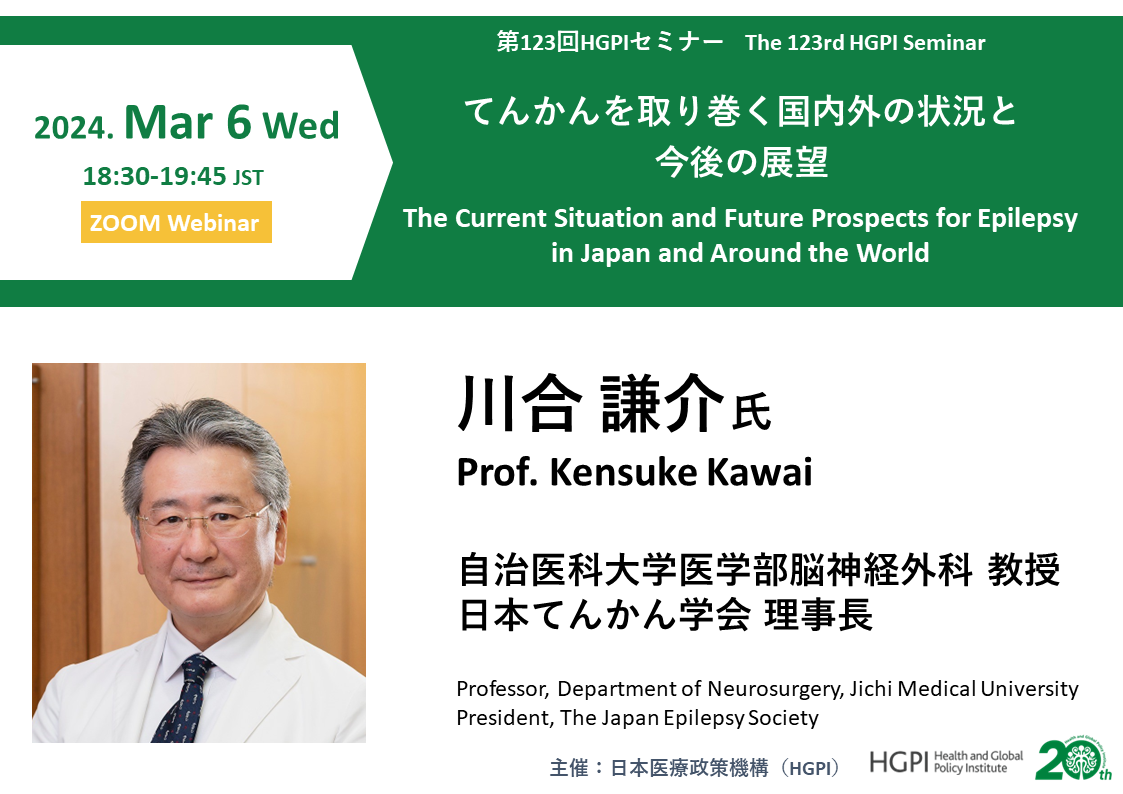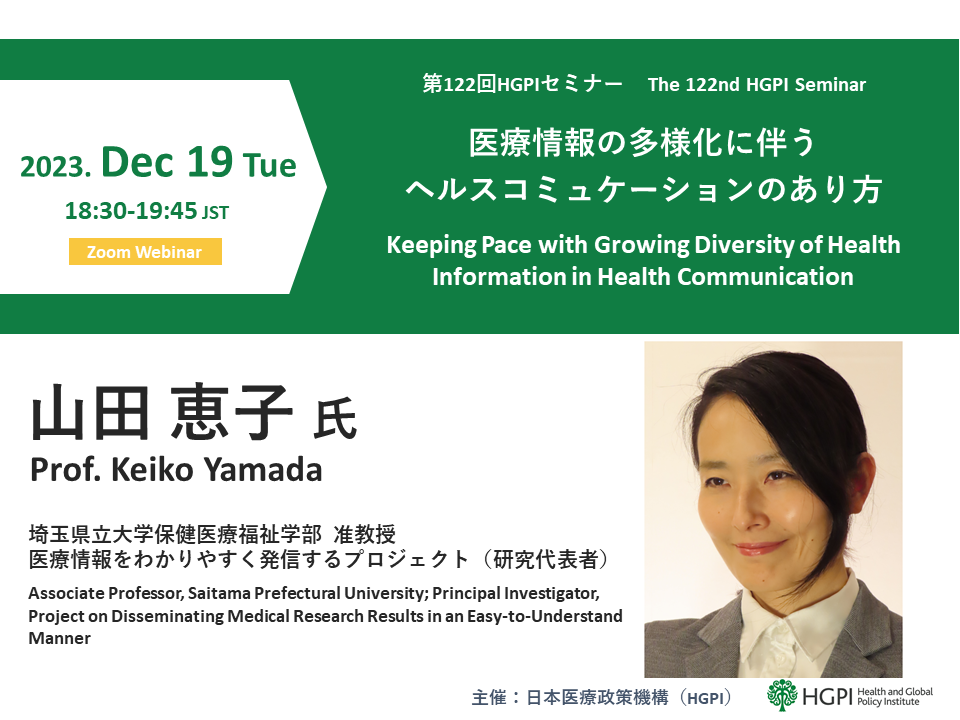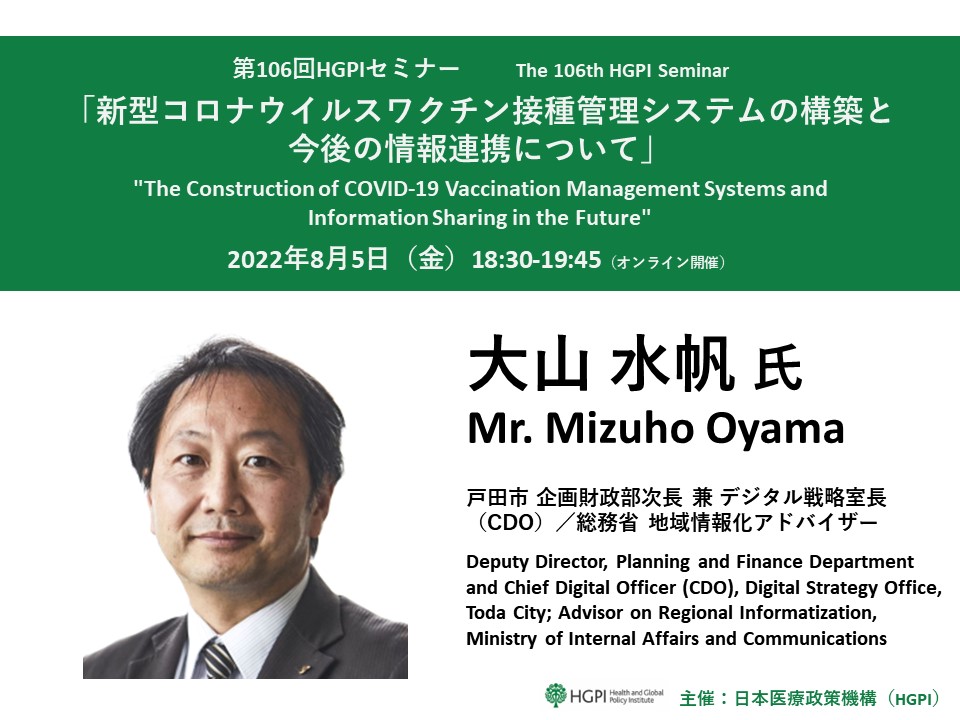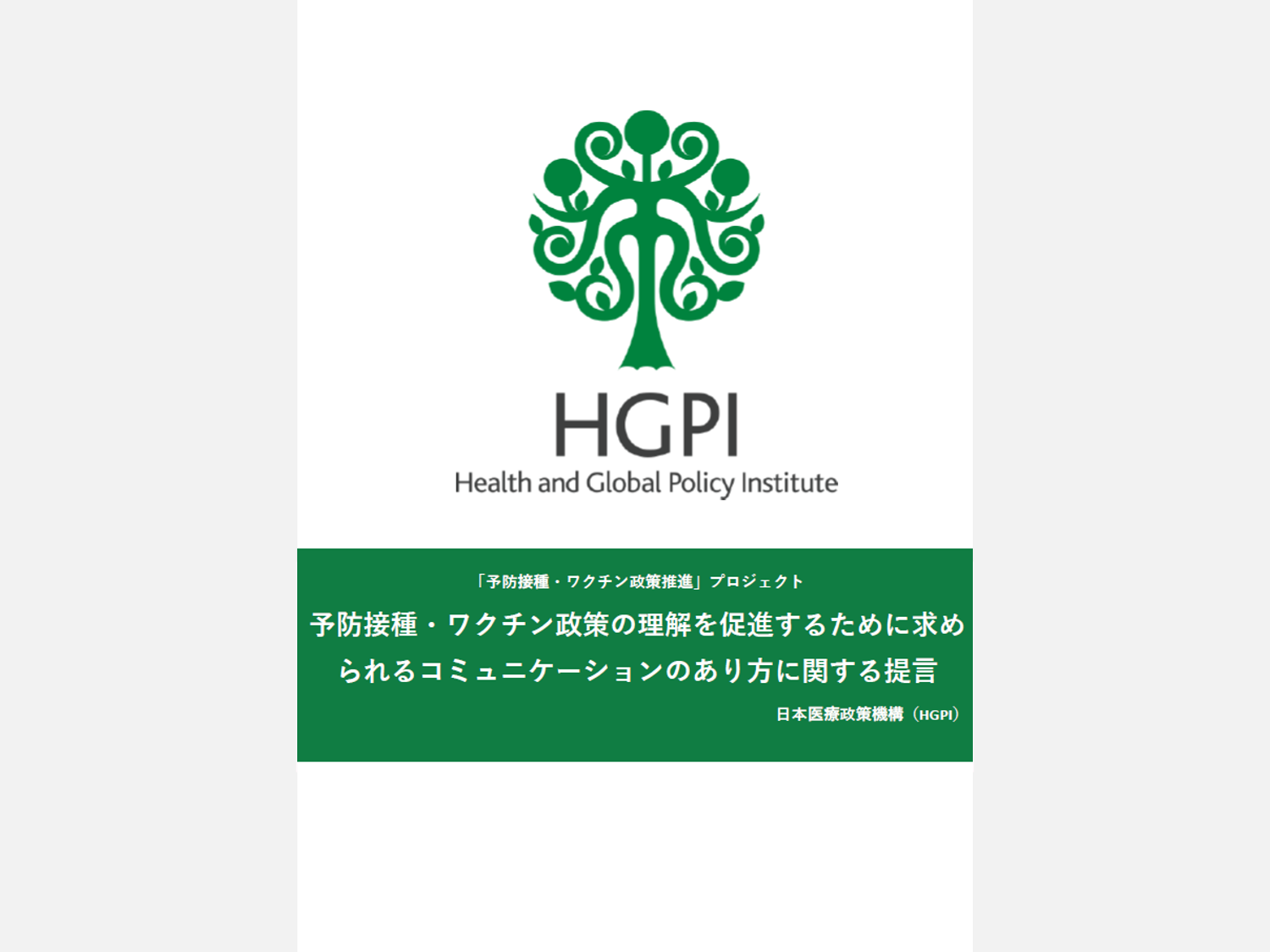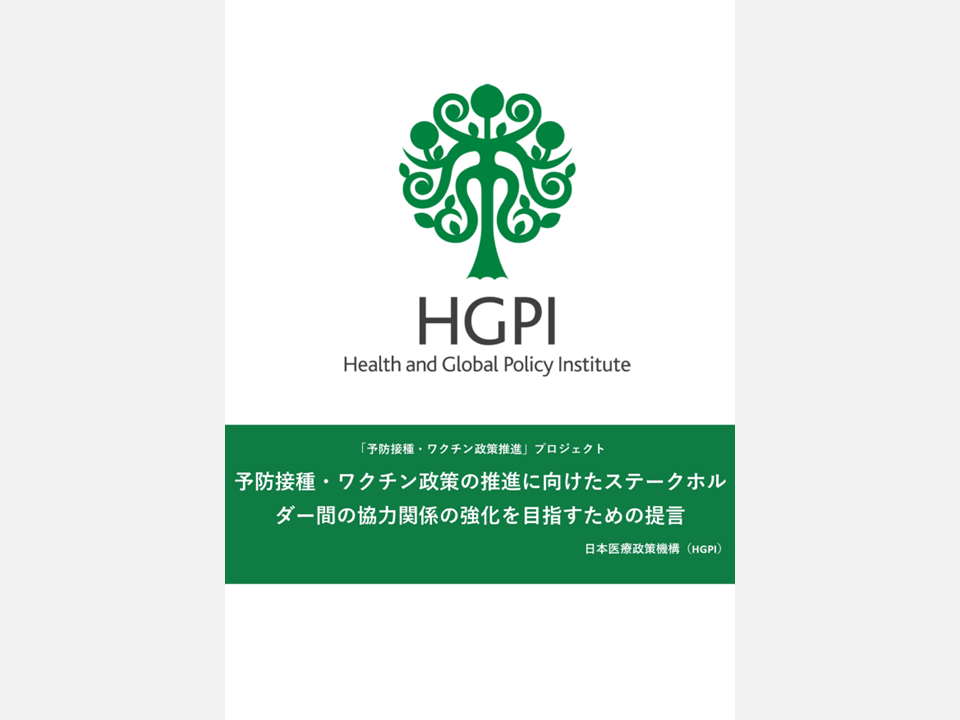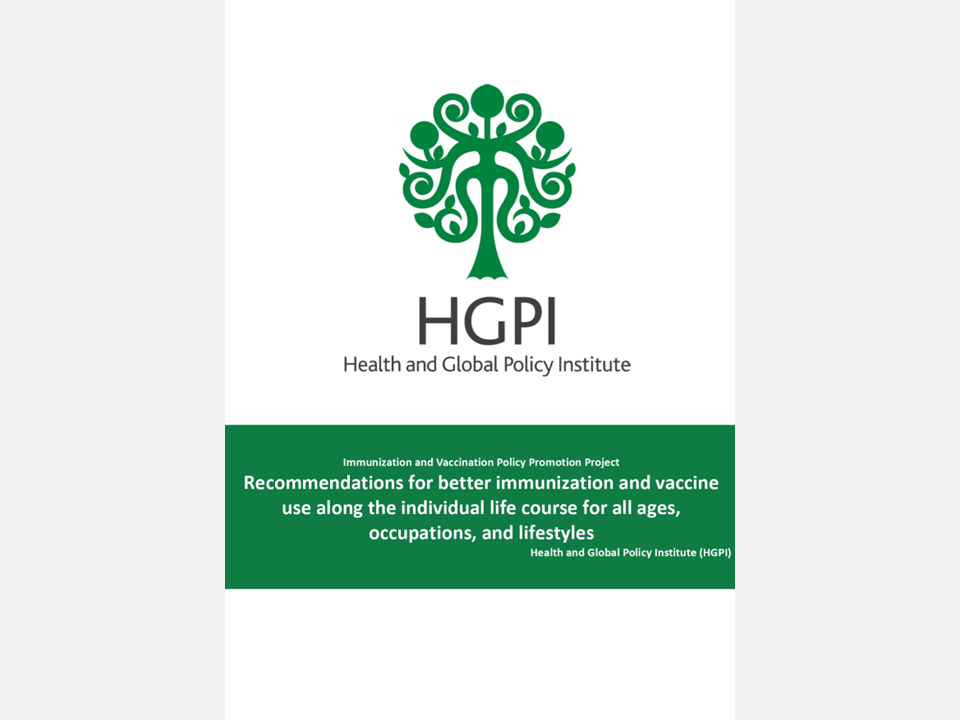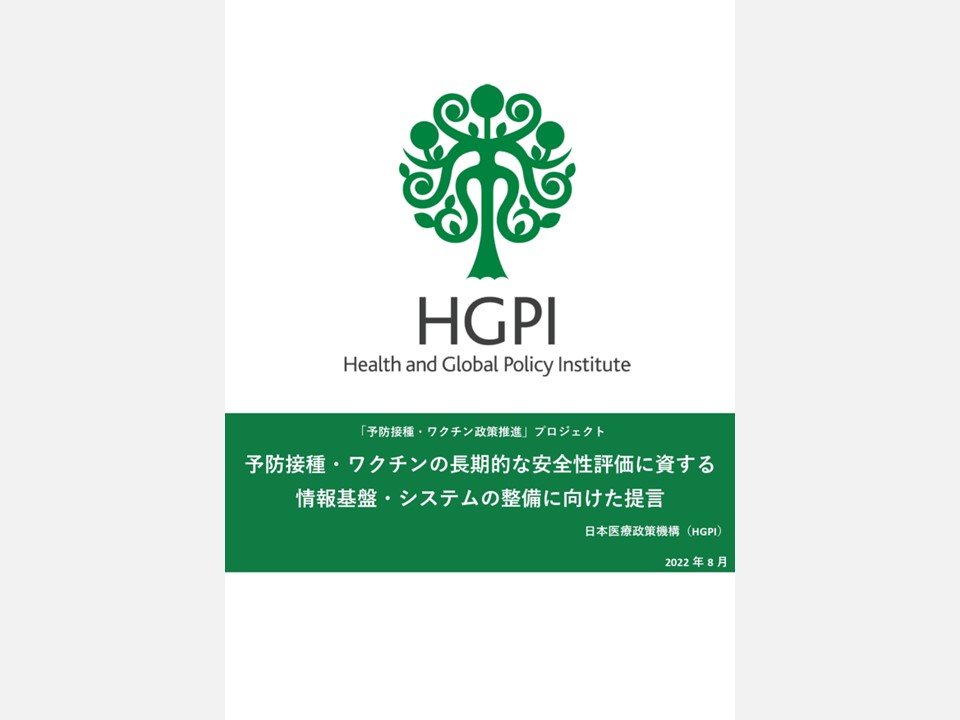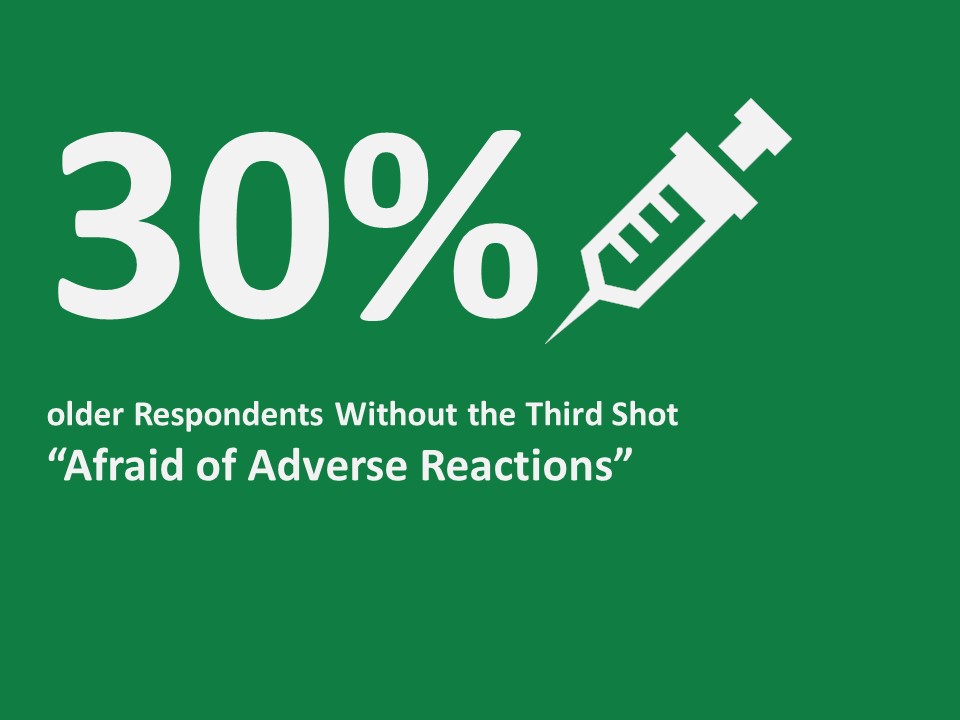[Event Report] The 124th HGPI Seminar “Reconsidering Infectious Disease Control Strategies Centering on Vaccination and Immunization – From the Experiences of the COVID-19 Pandemic and a Life Course Approach” (April 26, 2024)
date : 7/3/2024
Tags: HGPI Seminar, Vaccinations
![[Event Report] The 124th HGPI Seminar “Reconsidering Infectious Disease Control Strategies Centering on Vaccination and Immunization – From the Experiences of the COVID-19 Pandemic and a Life Course Approach” (April 26, 2024)](https://hgpi.org/en/wp-content/uploads/sites/2/hs124-1-top-P4262197.jpg)
For the 124th HGPI Seminar, we hosted Ms. Narumi Hori, a Registered Nurse and Infection Control Consultant for a lecture titled, “Reconsidering Infectious Disease Control Strategies Centering on Vaccination and Immunization – From the Experiences of the COVID-19 Pandemic and a Life Course Approach.”
Key points of the lecture
- The Coronavirus Disease 2019 (COVID-19) pandemic placed a spotlight on issues related to immunization and vaccination, such as emergency preparedness and digitalization. However, another major issue is during periods of non-emergency, disparities have emerged depending on where one lives, one’s age, and other such factors. People require lifelong immunization based on a life course approach, and vaccination support should be expanded fairly throughout Japan.
- It will be vital to have staff in place who can handle immunization and vaccination duties during both normal times and emergencies, but efforts to train specialists in this area in Japan are still in the developmental stage. A Government initiative to establish one vaccination center in each prefecture has been advancing since FY2001. Vaccination centers and related facilities should be fully utilized and their functions should be expanded to encourage mutual learning and collaboration among vaccination professionals and educators.
Examining how to best structure public subsidies based on a life course approach and correcting disparities resulting from personal factors like area of residence, age group, or nationality
Depending on the municipality where one lives, public subsidies for vaccinations vary in duration and by age group, resulting in disparities during periods of non-emergency. Looking at the systems for providing subsidized voluntary combined measles-rubella (MR) vaccinations in Tokyo, for example, the way vaccinations are handled varies by district. While some districts do not subsidize adult MR vaccinations, Minato City does, and for a wide range of ages. In particular, Minato City fully subsidizes voluntary MR vaccinations for residents who missed routine MR vaccinations as infants or during childhood. Minato City also has a system for conducting measles antibody tests among guardians who are age 19 or older and live with children under the age of one. Those found to have low antibody titers are eligible for partial subsidies for vaccines like the MR vaccine.
Examining vaccine uptake in Japan during the COVID-19 pandemic, we see that there were disparities in uptake by nationality. Vaccination rates among registered non-Japanese residents or people with permission to reside in Japan was about 10% lower than Japanese nationals. From the perspectives of infectious disease control and cluster countermeasures, efforts to encourage prompt vaccination among residents must include non-Japanese residents, but language barriers may have resulted in high hurdles to providing notifications or guidance for medical examinations. As more communities become home to residents with overseas roots, necessary measures that require rapid government action will be to expand multilingual support in vaccination systems and to accommodate cultural diversity.
Another essential step in achieving a life course approach to immunization and vaccination will be to digitize vaccination records. Japan should establish an environment that allows people to check their own full vaccination records at any point in their lives, as well as their history of visits to health facilities. As of April 2024, in accordance with the Order for Enforcement of the Immunization Act, the retention period for vaccination ledgers is five years. This means that after five years, people will no longer be able to view their vaccination information on Mynaportal. Furthermore, vaccination ledgers do not contain information on voluntary vaccinations. As a measure to optimize digitalization, another item being examined is the transfer of vaccination records stored in and managed with the Vaccination Record System (VRS)—which was created to ensure a smooth rollout of COVID-19 vaccines—to a new system that is set to be established (as of January 2024). Municipalities that do not use the VRS as their vaccination ledger must now maintain accurate vaccination records from FY2023 and earlier that are stored and managed in the VRS, so there are many issues related to digitizing vaccination records and related administrative tasks that must be addressed to help prevent people from missing vaccinations.
Training specialists who can play active roles in promoting immunization and vaccination, and establishing new or additional qualification systems to support their education
To facilitate future measures for infectious disease control and vaccinations, while keeping measures for emerging and re-emerging infectious diseases in mind, it will also be important to develop professionals with specialized training on immunization and vaccination and to establish a system that stations them in communities to establish response capacity during periods of non-emergency. In Australia, an accreditation body called Health Education Services Australia (HESA) has already established a nurse immunizer study program to train and certify nurses as specializing in vaccination. HESA also operates the “Accreditation of Immunisation Education Program,” which provides healthcare professionals the knowledge and techniques needed to administer vaccines safely by completing the necessary modules. In Canada, the Canadian Paediatric Society, the Public Health Agency of Canada, and Health Canada designed the Education Program for Immunization Competencies (EPIC), which provides systematic education to health professionals.
On the other hand, efforts to train vaccination professionals in Japan are still in the developmental stage. For example, there are no qualifications for nurses to pursue in the field of immunization and vaccination within Certified Nurse Specialist or other certification programs. While public health nurses are specialists in public health, the knowledge they possess is often general in nature and they are not necessarily specialists in immunization and vaccination. Key steps for encouraging the development of specialists in Japan are likely to include establishing reliable training programs under the leadership of academic societies and professional associations, having workplaces compensate health professionals for training expenses, and expanding duties for professionals who complete training while providing them with incentives.
Utilizing and enhancing vaccination centers to serve as platforms for vaccination professionals and educators
Since FY2001, the Ministry of Health, Labour and Welfare (MHLW) has been advancing an initiative called the “Project to Promote Vaccination Center Functions” and aims to establish one vaccination center in every prefecture in accordance with the “Framework for the Promotion of Vaccination Center Functions.” This initiative aims to expand vaccination systems at healthcare institutions with physicians specializing in vaccination to create an environment which facilitates vaccinations for community members. To help realize this, half of the budget for vaccination center activities is covered by the national Government infectious disease control budget (part of which is funding for the Project to Promote Vaccination Center Functions) as “Supplementary Funding from the National Treasury for Infectious Disease Prevention Initiatives.” Despite the availability of funding, as of March 2023, only 25 centers had been established in 20 prefectures, and they also face issues related to the standardization of the content of their duties. Since vaccination center activities include training healthcare professionals, expectations are high for them to grow and function as platforms to promote mutual learning and collaboration among vaccination professionals and educators.
[Event Overview]
-
- Speaker: Narumi Hori (Registered Nurse / Infection Control Consultant)
- Date & Time: April 26, 2024 (Friday) 13:00-14:30 JST
- Format: In-person (No online streaming)
- Venue: Global Business Hub Tokyo
- Language: Japanese (No simultaneous interpretation)
- Participation Fee: Free
- Capacity: 50 people (first-come, first-served)
■Profile
 Narumi Hori (Registered Nurse / Infection Control Consultant / President, Infection Control Lab LLC / Adjunct lecturer, Department of Infectious Diseases, Division of Comprehensive Patient Care, Medical and Dental Sciences, Graduate School of Medical and Dental Science, Tokyo Medical and Dental University / Research Fellow, Center for Surveillance, Immunization and Epidemiologic Research, National Institute of Infectious Diseases)
Narumi Hori (Registered Nurse / Infection Control Consultant / President, Infection Control Lab LLC / Adjunct lecturer, Department of Infectious Diseases, Division of Comprehensive Patient Care, Medical and Dental Sciences, Graduate School of Medical and Dental Science, Tokyo Medical and Dental University / Research Fellow, Center for Surveillance, Immunization and Epidemiologic Research, National Institute of Infectious Diseases)
Graduated from Kanagawa University’s Faculty of Law and Tokyo Women’s Medical University School of Nursing. Withdrawn from the doctoral program at Tokyo Gakugei University Graduate School (Master’s in Education). Completed the National Institute of Public Health (Health Crisis Management, Master of Public Health). After working in infectious disease departments at private and public hospitals, she completed the Field Epidemiology Training Program (9th term) at the National Institute of Infectious Diseases from 2007-2009, served as an assistant professor (Nursing Education/Infectious Disease Nursing) at St. Luke’s International University from 2009-2012, and has been working at the International Clinical Research Center of the National Center for Global Health and Medicine since 2013 (Infectious Disease Control Specialist). In April 2015, she concurrently took on the role of Medical Coordinator at the International Medical Care Department. She resigned from the National Center for Global Health and Medicine in July 2018. In August 2018, she became a freelance consultant (Infectious Disease Control/Global Measures for Communities and Organizations).
日本語
Top Research & Recommendations Posts
- [Announcement] A Turning Point Towards Building Green Healthcare Systems (June 5, 2024)
- [Policy Recommendations] Developing a National Health and Climate Strategy for Japan (June 26, 2024)
- [Publication Report] Guidance on Patient and Public Involvement (PPI) in Health Policymaking: Necessary Initiatives and Good Examples from the Public and Government (March 31, 2024)
- [Policy Recommendations] Obesity Control Promotion Project 2023 “The Next Steps for Engaging and Cooperating with Patients, Citizens, and Communities for Implements of Obesity Control Measurements” (April 8, 2024)
- [Research Report] Healthcare DX Project Research Report of Interviews ”Expectations for the Coming Era of Healthcare DX from People Living with Health Concerns” (June 10, 2024)
- [Research Report] Building a Mental Health Program for Children and Measuring its Effectiveness (June 16, 2022)
- [Announcement] A Significant Step Towards the Building a Green Healthcare System: Support for the Formal Expression of Interest by the Japanese Government Delegation to the ATACH at the Executive Board Meeting of the WHO (February 16, 2024)
- [Policy Recommendations] Patient and Public Involvement (PPI) Support Project “Promoting PPI in the Policymaking Process” (May 14, 2024)
- [Public Comment Submission] “The Fifth Fundamental Plan for Establishing a Sound Material-Cycle Society (Draft)” (May 22, 2024)
- [Policy Recommendations] Recommendation for the Basic Policy on Economic and Fiscal Management and Reform 2024 (June 11, 2024)
Featured Posts
-
2024-06-21
[Event Report] HGPI Special Seminar – HGPI Celebrates its 20th Anniversary: Reflecting on HGPI’s Journey from the Past to the Future (January 16, 2024)
![[Event Report] HGPI Special Seminar – HGPI Celebrates its 20th Anniversary: Reflecting on HGPI’s Journey from the Past to the Future (January 16, 2024)](https://hgpi.org/en/wp-content/uploads/sites/2/240116_HGPISeminar_eyecatch-1.png)
-
2024-06-25
[Public Comment Submission] Web based consultations on NCDs and mental health by World Health Organization (June 25, 2024)
![[Public Comment Submission] Web based consultations on NCDs and mental health by World Health Organization (June 25, 2024)](https://hgpi.org/en/wp-content/uploads/sites/2/ncd-ppi-ph-mh-20240625-top.png)
-
2024-06-26
[Policy Recommendations] Developing a National Health and Climate Strategy for Japan (June 26, 2024)
![[Policy Recommendations] Developing a National Health and Climate Strategy for Japan (June 26, 2024)](https://hgpi.org/en/wp-content/uploads/sites/2/NHCSJ_ENG.png)
-
2024-06-26
[Registration Open] (Webinar) The 127th HGPI Seminar: Current Issues and Future Prospects in Establishing a Health System and Protecting Public Health Through Policy (July 18, 2024)
![[Registration Open] (Webinar) The 127th HGPI Seminar: Current Issues and Future Prospects in Establishing a Health System and Protecting Public Health Through Policy (July 18, 2024)](https://hgpi.org/en/wp-content/uploads/sites/2/HGPI_20240718_127thHGPISeminar.png)
-
2024-07-01
[Registration Open] Meaningful Involvement Promotion Project Online Expert Meeting “Shaping the Future of Health Policy with People with Lived Experience and Citizens” (July 26, 2024)
![[Registration Open] Meaningful Involvement Promotion Project Online Expert Meeting “Shaping the Future of Health Policy with People with Lived Experience and Citizens” (July 26, 2024)](https://hgpi.org/en/wp-content/uploads/sites/2/HGPI_20240726_Shaping-the-Future-of-Health-Policy-with-People-with-Lived-Experience-and-Citizens.jpg)




